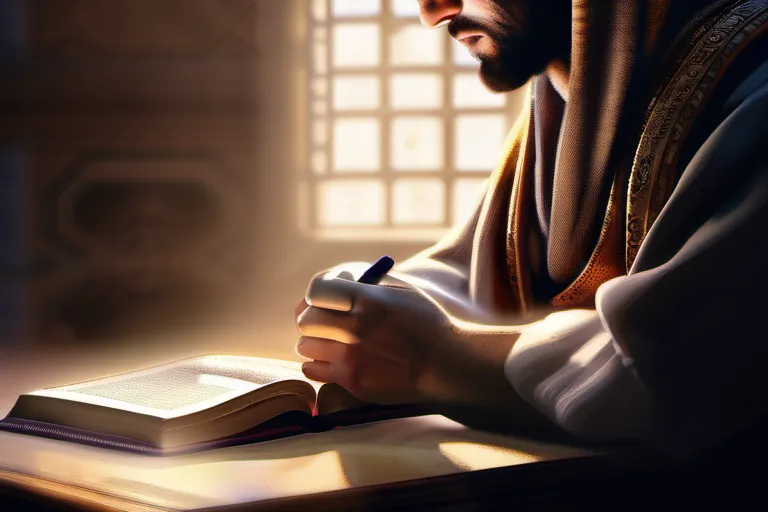Explore the significance, themes, and interpretations of the Old Testament book of Habakkuk within Christian faith.
The Old Testament book of Habakkuk is a powerful prophetic text that has intrigued Christians for centuries. In this article, we delve into its meaning, themes, and interpretations within Christianity.
The Historical Context of Habakkuk
Imagine stepping into the ancient world where the book of Habakkuk was written, a time when faith and doubt intertwined in a unique dance. The prophet Habakkuk lived during the reign of Jehoiakim, a king who reigned over Judah from 609 to 598 BCE. This period was marked by political turmoil, economic decline, and social injustice. How could a faithful people reconcile their trust in God with such stark realities? Habakkuk’s question echoes through the ages: “Why does God allow this suffering?”
Let’s delve into the historical context that shaped the prophet’s message. The book of Habakkuk paints a picture of a society on the brink, where evil seems to flourish unchecked, and justice is but a whisper. It was a time when the covenant relationship between God and His people seemed strained. “Doesn’t He see all this wickedness?” Habakkuk asked, his voice resonating with the doubts of many.
The setting in which Habakkuk wrote provides a backdrop that is both grim and hopeful. It highlights the tension between divine justice and human suffering, asking us to ponder if God’s justice is always immediate or if it unfolds in mysterious ways. This context helps us understand why the prophet felt the need to question his faith and explore deeper theological truths.
The historical setting of Habakkuk also introduces us to a pivotal moment in the development of prophetic literature. The prophets were not just oracles predicting the future but interpreters of current events, offering hope through God’s promises. Habakkuk’s experience of grappling with faith amidst suffering sets an example for Christians navigating their own doubts and challenges.
In this complex world, where good often seems to clash with evil, Habakkuk serves as a testament to the enduring struggle between faith and doubt. It invites us to question not just what we believe but why we believe it. The historical context of Habakkuk’s time challenges us to find balance in our own spiritual journeys, where the weight of suffering is heavy yet hope endures.
Key Themes and Symbolism in Habakkuk
Key Themes and Symbolism in Habakkuk
Have you ever pondered why Habakkuk, this enigmatic prophet, chose to delve into such profound themes as injustice, suffering, and the sovereignty of God? The recurring motifs throughout his book—symbols like the mighty warrior, the wine press, and the net—are more than just literary devices; they serve as powerful metaphors for the human condition in a world fraught with conflict and pain.
In Habakkuk 2:4, we read, ‘The righteous shall live by faith.’ This verse encapsulates the theme of trust and reliance on God’s justice. How many times have you wondered whether your faith is enough to sustain you through trials? Habakkuk’s message challenges us to hold onto our beliefs even when faced with apparent injustice.
The imagery of a mighty warrior (Habakkuk 3:13) can be seen as a symbol for God’s strength and protection. Just as a skilled warrior stands firm against the mightiest foes, so too does God uphold His people in times of adversity. Yet, Habakkuk also poses a question that haunts Christian readers: ‘Shall those who steal gain it? Shall they succeed who deal treacherously?’ (Habakkuk 2:9). This rhetorical query makes us reflect on our own lives and actions, inviting introspection about our values and the impact of our choices.
The net, a recurring image in Habakkuk’s prophecies (1:14; 3:12), symbolizes both capture and salvation. It can represent the encroachment of evil forces or, more positively, God’s ability to gather His people for protection and redemption.
Understanding these symbols helps us see that Habakkuk is not just a historical record but a profound meditation on faith in the face of suffering. Each symbol invites us to explore deeper meanings, encouraging us to look beyond surface-level answers and seek a more nuanced understanding of God’s plan for His people.
Interpreting Habakkuk: Jewish and Christian Perspectives
How do Jewish and Christian scholars view Habakkuk, and what makes it such a crucial text in understanding the spiritual journey through the lens of faith? The book of Habakkuk, often seen as a bridge between prophecy and apocalyptic literature, offers profound insights into the relationship between God and humanity.
Is it not intriguing how this small yet powerful prophetic book addresses themes that resonate deeply with believers today? From its opening lines, Habakkuk challenges us to ponder the nature of justice in a world where wickedness seems to flourish. Jewish and Christian scholars alike have sought to unravel the mystery of why God allows suffering and evil to persist, a question that remains as relevant now as it was centuries ago.
In exploring Habakkuk, we find a narrative filled with tension and dialogue between Habakkuk and his divine interlocutor. This dynamic interaction mirrors the conversations Christians have with their faith in times of hardship. For many, understanding these texts is like deciphering a code that holds the key to enduring through life’s storms.
From a Christian perspective, Habakkuk serves as a reminder of God’s steadfastness and the importance of maintaining hope even when faced with injustice. The prophet’s call for faith and trust in God’s sovereignty is echoed throughout Christian history, encouraging believers to persevere through challenging times.
Can we truly grasp the significance of this book without delving into its historical context and the theological debates it sparks? By examining how different interpretations have evolved over time, we gain a deeper appreciation for the enduring relevance of Habakkuk. This text challenges us to rethink our understanding of God’s character and purpose in the world, prompting ongoing dialogue within Christian communities.
The journey through Habakkuk is not just about understanding ancient texts; it’s about engaging with timeless questions that continue to shape our faith. Whether seen as a historical document or a living testament, this book invites us to confront the complexities of spiritual life and to find solace in God’s unyielding presence.
Habakkuk’s Prophetic Role and Message
Imagine Habakkuk as a solitary sentinel, standing firm on the rocky cliffs of faith, watching over Jerusalem as it teeters between security and turmoil. How did this prophet understand his role in such turbulent times? And what message does his prophecy hold for us today?
‘Why do you tolerate wrongdoing and look on when evil triumphs?’ (Habakkuk 1:3)
Habakkuk’s question echoes through the ages, challenging believers to confront the injustice and corruption that often seem rampant in their own societies. He lived during a time of moral decay and political upheaval, much like what many Christians might experience today. His query forces us to ask ourselves: Are we standing idly by while evil prevails? Or are we taking active steps to address these issues?
The prophetic role of Habakkuk was not just to deliver a message but to inspire action. He called the people of Judah to face their problems head-on, urging them to seek justice and righteousness. This is where we find one of the most profound themes in his book – the struggle between divine judgment and human perseverance.
How does this apply to us? Just as Habakkuk wrestled with God about His ways, so too do Christians today grapple with similar questions. We might ask, ‘Is it just for us to pray silently while injustice continues?’ The answer lies not in silence but in active engagement and faith.
Habakkuk’s message is a call to live by hope even in the face of seemingly insurmountable challenges. It’s about trusting that despite the chaos, God still holds the reins. This faith can be our beacon during times when it feels like darkness reigns supreme. As Christians, we must remember that our role is not only to endure but also to be a light in a world often shrouded by shadows.
The Book of Habakkuk in the New Testament
The Book of Habakkuk in the New Testament: Explore how the book of Habakkuk is referenced and alluded to in the New Testament, and its significance for Christian readers.
As we delve into the New Testament, one might wonder if there are any echoes from the Old Testament prophets. Could it be that Habakkuk’s voice resounds through the pages of the Gospels and Epistles? Indeed, while direct references to Habakkuk in the New Testament may not be as explicit as those to other prophets like Isaiah or Jeremiah, his themes of faith, justice, and divine providence find echoes in various places. How do these passages speak to us today?
Consider the Parable of the Talents in Matthew 25:14-30. The master entrusts different amounts of money to his servants, much like Habakkuk’s call for faith and trust in God’s sovereignty. Just as Habakkuk questioned why injustice prevails, Jesus’ parable challenges us to use our gifts wisely—whether it be financial resources, spiritual gifts, or our time.
Another connection can be found in the Book of Revelation, where John’s vision of a just and fair world aligns with Habakkuk’s longing for righteousness. In Revelation 22:3-5, we read, ‘And there will be no more curse; and the throne of God and of the Lamb will be in it, and his servants will serve him; they will see his face, and his name will be on their foreheads.’ This verse mirrors Habakkuk’s vision of a transformed society where faith and justice are one.
These New Testament passages invite us to reflect on our own roles as believers. Are we waiting idly for God’s intervention, or are we actively participating in the kingdom of God? Do we trust in divine providence, even when life seems unfair?
The book of Habakkuk teaches us that faith is not passive; it requires action and perseverance. In a world often marred by injustice, these themes resonate with powerful implications for our Christian walk.
Applying the Lessons of Habakkuk Today
How often do we find ourselves questioning the justice and righteousness of God, especially when we witness evil and injustice around us? Is it just me, or does this feel like Habakkuk’s time all over again?
Habakkuk’s journey in the Old Testament serves as a profound reminder to us today. Imagine facing a world where wickedness seems to reign supreme—this is what Habakkuk encountered. He was troubled by the corruption and violence that surrounded him, but instead of giving up hope or turning away from God, he turned his gaze directly towards Him.
One of the most powerful lessons we can draw from Habakkuk’s experience is the importance of maintaining our faith in God’s righteousness even when things seem bleak. ‘For though the fig tree shall not blossom, neither shall fruit be in the vines; the labor of the olive shall fail, and the fields shall yield no food; the flock shall be cut off from the fold, and there shall be no herd in the stalls: Yet I will rejoice in the Lord, I will joy in the God of my salvation.’ (Habakkuk 3:17-18)
How can we apply this to our lives? When faced with challenges or when it seems that evil is winning, do we hold onto faith or let doubt take over? Habakkuk teaches us that even in the darkest times, we must trust God’s plan and find joy in Him.
Another lesson we learn from Habakkuk is the importance of speaking up for what is right. ‘Will He spare the ungodly?… He will not always accuse, nor will He keep His anger forever.’ (Habakkuk 3:2,14) This verse encourages us to be vocal about injustice and reminds us that God will ultimately judge and set things right.
As Christians, we can take inspiration from Habakkuk’s courage. We too have a role to play in speaking out against evil and advocating for justice. Whether it’s through our words or actions, let us not remain silent when we see injustice. Our voices matter, and together, we can make a difference.
Lastly, Habakkuk teaches us the power of prayer. Through his laments and praises to God, he models a life deeply intertwined with spiritual warfare. ‘How long, O Lord, will I cry for help, while You will not hear? I cry out to You, ‘Violence! Violence!’ But He answers me:’ (Habakkuk 1:2) This calls us to persist in our prayers, even when the response seems delayed.
In our busy and often chaotic world, Habakkuk’s words serve as a constant reminder to stay grounded in faith, stand up for justice, and never give up hope. As we navigate through life’s challenges, may we find strength in His promises and courage in His presence.
Conclusion
 By understanding the historical context, symbolism, and spiritual lessons found in Habakkuk, readers will gain a deeper appreciation for this important biblical text and its relevance to their faith today.
By understanding the historical context, symbolism, and spiritual lessons found in Habakkuk, readers will gain a deeper appreciation for this important biblical text and its relevance to their faith today.











